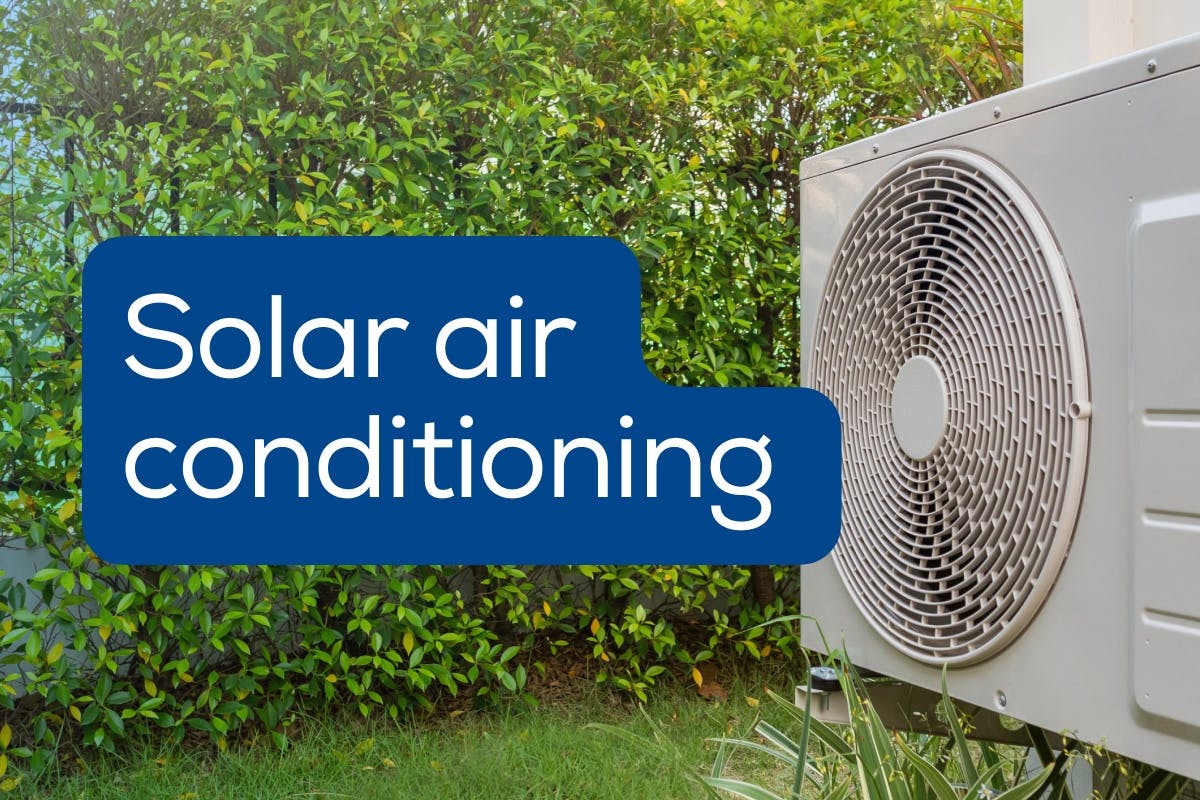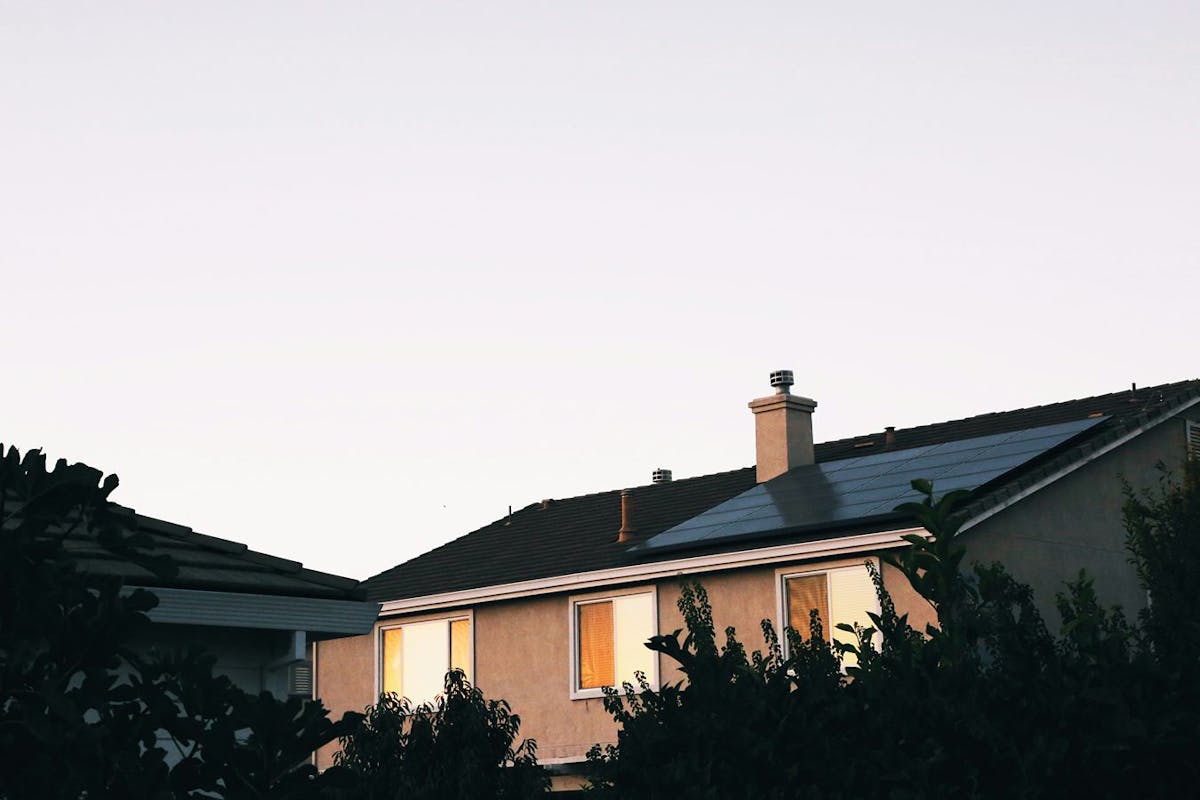Solar Panels and Air Conditioning: A Guide to Savings
Last edited
Author
Andrew Giermak
Solar and Electrification Writer and Editor
Editor
Andrew Blok
Electrification and Solar Writer and Editor

If you’re already using home solar power or are thinking of going solar, powering your air conditioning with solar energy can save you money and keep your home comfortable.
In the US, 88% of households use air conditioning. That number is 92% in the Midwest and 93% in the South. Often, your power bill is highest in the months you’re running the AC the most. Luckily, solar energy production is also highest in the summer.
So, looking into a new energy-efficient air conditioner you can run on solar power could be a solution. Along with cost savings, using clean, renewable energy is simple and reliable.
See how much you can save by going solar with Palmetto
What is Solar Air Conditioning?
Before we go any further, it’s important to know there are two main types of solar air conditioners.
While you may be imagining an all-in-one solar-powered air conditioning appliance, any home generating electricity with a solar panel installation can also cut utility costs and carbon emissions while running the AC.
Essentially, solar air conditioners can be divided into two categories:
- Whole-home solar power and air conditioning systems
- Independent solar thermal air conditioning units
In a whole-home system, an array of photovoltaic (PV) solar panels will generate the electricity used as a power source to run the air conditioning and other appliances. Separately, solar thermal air conditioners utilize built-in solar heat collectors and refrigeration systems to cool a space in one seamless process.
Solar thermal AC units are typically built into a property or placed strategically to cool a specific area of an interior. However, whole-home solar set-ups can seamlessly replace the utility electricity traditionally used to power HVAC systems or portable AC appliances and power the rest of your house too.
How Solar Air Conditioners Work
Although they are all technically fueled by the sun, solar-powered air conditioners can operate with one of three power sources.
Solar thermal air conditioners
Using technology similar to solar water heating, solar thermal air conditioners collect energy from the sun and transfer it in a thermodynamic process. Solar air conditioners use the sun’s heat to evaporate a refrigerant fluid, which absorbs heat when it condenses, cooling the air. They can also heat water.
Solar thermal air conditioners are not very common for residential use, but products do come in many different forms and capacities. In a closed energy loop, solar thermal air conditioners are usually “all-in-one,” but many come as “mini-split systems” with detached parts for the heat capture and cooling processes.
DC and AC air conditioners
Today, the majority of both central air conditioners and individual cooling appliances run on alternating current (AC). Because solar panels generate direct current (DC) electricity, every grid-tied solar energy system uses either a single DC inverter or a group of microinverters to modify the electricity into the usable AC power that runs a home’s electrical systems.
In some instances, like off grid homes using a battery backup, special DC-powered air conditioners may be a better fit, since no energy will be loss in the conversion from DC to AC electricity.While a DC air conditioner may be the best-case scenario for instances in which power generation is limited and efficiency must be maximized, in most cases AC air conditioners paired with a normal solar panel system is the best solution.
See how much you can save by going solar with Palmetto
How Many Solar Panels Do I Need for Solar Air Conditioning?
The number of solar panels you need to run your solar air conditioning system depends on a few key factors:
- Your home’s overall energy consumption
- Your solar panels' output and efficiency
- The amount of annual sunlight your home receives
At a minimum, your rooftop solar panel system should generate enough energy to offset the power consumption of your air conditioner. For instance, if your air conditioner requires 900 watts of power, you would need at least three solar panels rated at 300 watts each.
If you want to power your entire home (including the air conditioner) with renewable energy, you must install enough solar panels to cover the entire property’s electrical load. To calculate this, take a look at your utility bills to see the amount of electricity your home consumes annually in kilowatt-hours.
As an example, let's say you use an average of 1,000 kWh per month. This means your system would have to generate approximately 33 kWh daily (1,000 kWh divided by 30) or 1,390 watts per hour (33 kWh divided by 24 hours x 1,000).
In areas with 6 hours of peak sunlight, you would have to generate approximately 8,340 watt-hours daily (6 x 1,390) to cover the entire electrical load. With 400W modules, this means you should install approximately 21 solar panels (8,340Wh divided by 400W) to power your entire home and air conditioning system.
The Benefits of Pairing Solar Panels and Air Conditioning
Whether you use a solar thermal appliance or photovoltaic (PV) solar panels, cooling your home with solar power can offer both environmental and financial benefits.
Save on utility bills
Solar energy systems use the most abundant natural resource on the planet: free sunlight. Solar panels can reduce the amount of electricity you consume from the utility grid, which in turn can lower your monthly bills and could help you avoid time-of-use and higher-tiered electricity rates.
For even more savings, a heat pump system for heating and cooling can further reduce your energy needs, as they’re typically the most efficient choice.
Environmentally friendly
Both solar thermal air conditioners and full-home systems can reduce your home’s carbon footprint because they use emission-free energy. Electricity from the gridr is generated with a variety of resources, often including fossil fuels.
Renewable energy tax incentives
Solar panels and heat pumps may qualify for certain tax incentives. Depending on the eligibility of your system, as well as your tax liability, you may be able to reduce the upfront costs of powering your air conditioner with solar power with the federal solar tax credit or available state tax exemptions.
Off-grid potential
Battery-backed off-grid or hybrid solar energy systems may be able to continue running air conditioners when utility power is unavailable depending on the size of your battery and the energy demand of your air conditioner.
How Solar Air Conditioning Can Lead to Savings
Considering that in 2020, about 52% of US households’ energy consumption was for heating and cooling, your heating and cooling system is a prime opportunity to save. Using solar panels to power a heat pump can reduce your heating costs, too.
Your long-term savings can depend on factors such as your current utility rate, your area climate and weather, your normal AC usage, and your home size.
With any type of AC unit, looking for the highest EER (Energy Efficient Ratio) or SEER (Seasonal Energy Efficient Ratio) is a good starting point for energy efficiency. Energy Star-certified central air conditioning systems have a SEER of 15 or higher and heat pumps have a SEER 17 or higher. Higher SEER units can be more expensive upfront, but return better long term savings. Tax credits for heat pumps and air conditioners could bring down the overall cost.
To find out what solar panels and other home energy interventions could save you, check out Palmetto’s free solar design and savings estimate tool or contact a Palmetto expert today.
See what solar can do for you:
Frequently Asked Questions
Can solar panels run my air conditioner?
Solar panels can generate the power to run your air conditioner and all of the electric appliances and systems in your home.
What is a solar thermal air conditioner?
A solar thermal air conditioner takes energy from the sun and uses a thermodynamic process, basically with refrigerant fluid and a fan, using a minimal amount of electricity to cool an area.
Do solar-powered air conditioners exist?
Yes, while only used in a small percentage of homes in the US, solar-powered ACs are available. Mostt homes will be better served with a standard, energy-efficient air conditioner or heat pump paired with rooftop solar panels.


